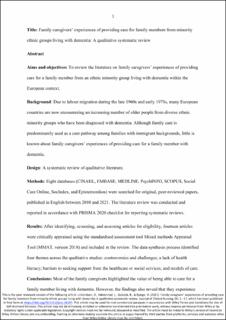Family caregivers’ experiences of providing care for family members from minority ethnic groups living with dementia: A qualitative systematic review
Peer reviewed, Journal article
Accepted version
Permanent lenke
https://hdl.handle.net/11250/2834042Utgivelsesdato
2021-11-16Metadata
Vis full innførselSamlinger
Originalversjon
https://doi.org/10.1111/jocn.16127Sammendrag
Aims and objectives: To review the literature on family caregivers’ experiences of providing care for a family member from an ethnic minority group living with dementia within the European context. Background: Due to labour migration during the late 1960s and early 1970s, many European countries are now encountering an increasing number of older people from diverse ethnic minority groups who have been diagnosed with dementia. Although family care is predominantly used as a care pathway among families with immigrant backgrounds, little is known about family caregivers’ experiences of providing care for a family member with dementia. Design: A systematic review of qualitative literature. Methods: Eight databases (CINAHL, EMBASE, MEDLINE, PsychINFO, SCOPUS, Social Care Online, SocIndex, and Epistemonikos) were searched for original, peer-reviewed papers, published in English between 2010 and 2021. The literature review was conducted and reported in accordance with PRISMA 2020 checklist for reporting systematic reviews. Results: After identifying, screening, and assessing articles for eligibility, fourteen articles were critically appraised using the standardised assessment tool Mixed methods Appraisal Tool (MMAT, version 2018) and included in the review. The data synthesis process identified four themes across the qualitative studies: controversies and challenges; a lack of health literacy; barriers to seeking support from the healthcare or social services; and models of care. Conclusions: Most of the family caregivers highlighted the value of being able to care for a family member living with dementia. However, the findings also reveal that they experience controversies and challenges due to their lack of dementia health literacy and perceived barriers to seeking healthcare support. Relevance to clinical practice: The findings from the current review can inform healthcare and social services in relation to implementing models of care that facilitate and complement family caregivers’ role in caring for family members living with dementia from minority ethnic groups.
